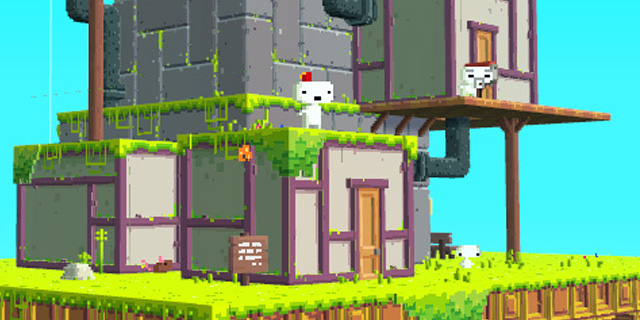
Sometimes I look over at my shelf of games and grumble to myself, “things aren’t what they used to be.” I’m not unsatisfied with games today; sometimes it just feels like there’s something missing. Gaming has changed so drastically since the rather simplistic, seemingly carefree days of the 8 and 16-bit eras. Whenever a new game comes along that emulates that style, it can succeed, but not to the level I want it to. Examining Fez with my nostalgia goggles on brought me gratification, but when I took those goggles off, I found out that the folks at Polytron understand. They were well aware of that era in games and knew how to properly emulate it. They get it.
Fez is a puzzle-platformer that, like many games before it, attempts to emulate an era in gaming that many of us are fond of. The presentation alone is enough to grab the attention of anyone who cherishes that time in gaming history. Unlike other, similar games, Fez does more than that: it forges its own path and creates an experience that is reminiscent of the past while staying true to a design that feels modern.
You play as Gomez, a strange white (and hopefully fluffy) creature that is granted the power to rotate his 2D world around, revealing its real, 3D nature. With a sense of wonderment, Gomez, and in turn the player, discovers this unique 3D perspective in a way that is similar to our own discovery of 3D games. It’s overwhelming at first and takes time to adjust, but soon enough you will find yourself manipulating the cube-like nature of this world like a pro. The platforming part of this puzzle-platformer is relatively simple. Controlling Gomez takes a little getting used to, but death is never a major obstacle, as you will always respawn on the last piece of solid ground you stood on. The puzzles are the main focus here.
You use the rotation mechanic to shift the world at 90-degree increments and, from there, are able to solve the game’s many puzzles. It begins as simply as learning to shift the level in order to change the perspective to make climbing terrain easier. Eventually you’ll learn to rotate mid-jump and time your rotations just right in order to solve more specific puzzles. As you do so, you’ll find yourself collecting shards of cubes that are necessary to open new areas. Once you grasp the basics, you’ll be able to find most of these shards with no problems. But that’s only half of the adventure.
The game also presents the player with Anti-Cubes, which are like the shards, but are attached to the more difficult puzzles of the game. Some will have you attempting to move blocks in order to make them appear in a certain pattern from all four sides. Others will have you deciphering the game’s complex alphabetical and numerical systems in order to proceed. This is the first game in a long time that made me pull out a notebook and begin taking notes.
Each new Anti-Cube puzzle you run into will mostly likely be harder than the last. These sections are entirely optional and only for the bravest of puzzle-solvers, but the rewards are entirely worth the effort. Every moment of frustration was met with an even greater moment of amazement as I manage to figure out puzzles that I couldn’t even begin to wrap my head around at first. These sections inspire a sense of accomplishment that seem right from that particular 8/16-bit era, but they are designed in a way that feel fresh and are not simply relying on nostalgia to succeed.
Unfortunately, there are a couple of problems that hold Fez back. For one, the map is very unintuitive. Eventually you will begin to get the hang of it, but once you get to a point where you have uncovered most of the areas, you’ll find yourself running into some major navigation issues. Even with a map, there will be moments where tedium sets in and you grow tired of trying to find certain rooms or sections. There are warp zones that take you to the four main areas of the game, but even with those it can become tiresome. On top of that, there are a number of technical issues that you’ll run into, from slowdown to glitches like being caught in a death loop that cause you to restart the game.
Fez can be problematic at times, sure, but those things amount to nothing when compared to the sheer level of joy you will experience from solving a difficult puzzle and hearing the sweet tune of victory. This is a game that overcomes its issues with a level of fidelity that you rarely see in games today. Most importantly of all, it brought me back to an era that so many games desperately want to recreate but usually fall short. In short, Fez made me feel like a kid again.
Pros: Fantastic presentation, immersive gameplay, design that successfully blends the old and the new
Cons: Terrible map, some technical issues



















